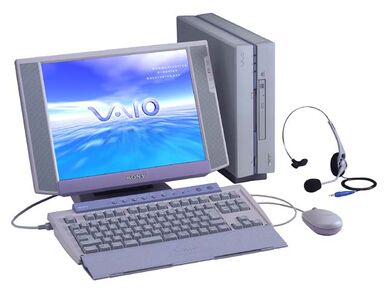PCV-L: Difference between revisions
More actions
Created page with "This page is currently WIP!! alt=PCV-L "SlimTop"|thumb|343x343px|PCV-L "SlimTop" ==Overview== The Sony VAIO PCV-L was a slim desktop PC component system released by Sony in 1999 with new models being launched until 2000. It came with a keyboard, mouse, PC and monitor which was available in 14.1" (1024x768) and 15" (1280x960 or 1024x768) sizes varying on model. It was marketed as a '''"'''smart desktop that allows you to interact in your own..." |
No edit summary |
||
| Line 1: | Line 1: | ||
This page is currently WIP!! | This page is currently WIP!! | ||
[[File:PCV-L "SlimTop".jpg|alt=PCV-L "SlimTop"|thumb| | [[File:PCV-L "SlimTop".jpg|alt=PCV-L "SlimTop"|thumb|388x388px|PCV-L "SlimTop"]] | ||
==Overview== | ==Overview== | ||
The Sony VAIO PCV-L was a slim desktop PC component system released by Sony in 1999 with new models being launched until 2000. It came with a keyboard, mouse, PC and monitor which was available in 14.1" (1024x768) and 15" (1280x960 or 1024x768) sizes varying on model. It was marketed as a '''"'''smart desktop that allows you to interact in your own style" by Sony, which probably referred to its CD-RW, and in some models DVD-ROM drive, Memory Stick drives and Floppy Disk Drives. | The Sony VAIO PCV-L was a slim desktop PC component system released by Sony in 1999 with new models being launched until 2000. It came with a keyboard, mouse, PC and monitor which was available in 14.1" (1024x768) and 15" (1280x960 or 1024x768) sizes varying on model. It was marketed as a '''"'''smart desktop that allows you to interact in your own style" by Sony, which probably referred to its CD-RW, and in some models DVD-ROM drive, Memory Stick drives and Floppy Disk Drives. | ||
[[File:PCV-L with included accessories.jpg|alt=PCV-L with included accessories|thumb|387x387px|PCV-L with included accessories]] | |||
As with a lot of other VAIOs of the time, the wallpaper on the unit is changed by a script to represent the different times of day: Morning, Midday, Sunset, Night. | As with a lot of other VAIOs of the time, the wallpaper on the unit is changed by a script to represent the different times of day: Morning, Midday, Sunset, Night. | ||
==Detailed Specs== | ==Detailed Specs== | ||
'''Processor: Celeron 600MHz - Pentium III 650/700MHz''' | '''Processor: Celeron 600MHz - Pentium III 650/700MHz'''[[File:Wallpaper changes according to time.gif|alt=Wallpaper changes according to time|thumb|Wallpaper changes according to time]] | ||
'''Graphics: ATI RAGE 128PRO 4XL''' | '''Graphics: ATI RAGE 128PRO 4XL''' | ||
Revision as of 13:17, 26 November 2023
This page is currently WIP!!

Overview
The Sony VAIO PCV-L was a slim desktop PC component system released by Sony in 1999 with new models being launched until 2000. It came with a keyboard, mouse, PC and monitor which was available in 14.1" (1024x768) and 15" (1280x960 or 1024x768) sizes varying on model. It was marketed as a "smart desktop that allows you to interact in your own style" by Sony, which probably referred to its CD-RW, and in some models DVD-ROM drive, Memory Stick drives and Floppy Disk Drives.

As with a lot of other VAIOs of the time, the wallpaper on the unit is changed by a script to represent the different times of day: Morning, Midday, Sunset, Night.
Detailed Specs
Processor: Celeron 600MHz - Pentium III 650/700MHz

Graphics: ATI RAGE 128PRO 4XL
Chipset: 440BX AGPset
Memory: 64/128MB (Standard) - 512MB (Maximum)
Display: 15" TFT LCD 1280x960 or 1024x768 - 14.1" 1024x768
Storage: 6.4-30GB IDE HDD
Weight: 5.5kg
MSRP: ~300,000 yen
Daily Usage Today
Still usable for some retro gaming and some basic office tasks. Anything that was possible when it was released will be possible today, for example Microsoft Office etc. Keep in mind that anything modern will not run. It could definitely still be used to watch some DVDs on a TV with composite out and maybe even a bit of light web browsing if you upgrade the CPU, RAM to the max, not to mention an IDE to mSATA SSD adapter. Keep in mind that any modern websites will not run, this is just for basic static HTML pages (neocities) and maybe some web archive pages. These machines are quite rare everywhere, even in Japan.
